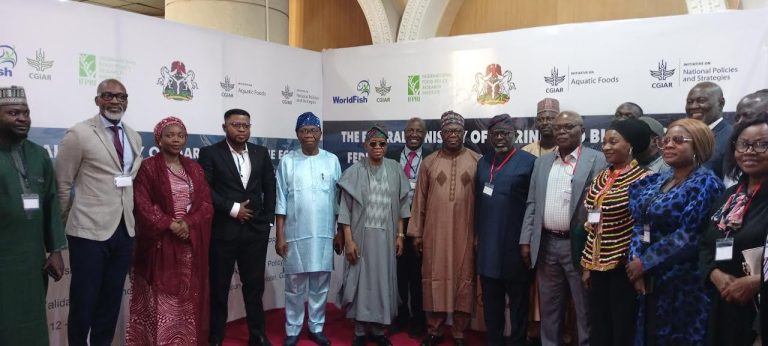From Idu Jude Abuja
The Federal Government of Nigeria says it is collaborating with major international bodies to bridge the gap between fish insufficiency, diet, revenue, and another agricultural value chain, just as it targets the production of 1.3 metric tonnes to meet local consumption.
The Minister of Marine and Blue Economy, Adegboyega Oyetola, remarked on Tuesday in Abuja while speaking in a two-day validation workshop on the National Fisheries and Aquatic Culture Policy of Nigeria.
The Minister encapsulated that in recent years, the Fisheries and Aquaculture sector has encountered numerous challenges, such as illegal fishing, overfishing, environmental degradation, and inadequate infrastructure and technological advancements.
He said, “To effectively tackle these issues and fully harness the potential of Nigeria’s aquatic resources, the Federal Ministry of Marine and Blue Economy, in collaboration with WorldFish and IFPRI, has developed a comprehensive National Fisheries and Aquaculture Policy.
“Our nation, blessed with a coastline of 853 km and 10,000 km of inland waterways, is also rich in natural resources. The creation of the Federal Ministry of Marine and Blue Economy to harness the resources of the ocean sustainably with the Renewed Hope agenda of President Bola Ahmed Tinubu GCFR for sustainable socio-economic development and national prosperity.
“To effectively tackle these issues and fully harness the potential of our aquatic resources, the Federal Ministry of Marine and Blue Economy, in collaboration with WorldFish and IFPRI, has developed a comprehensive National Fisheries and Aquaculture Policy.”
According to the former Governor of Osun State, the first stakeholder consultation for drafting the National Fisheries and Aquaculture Policy took place on August 22–23, 2023, which provided valuable input from stakeholders regarding policy directions and strategies.
He said, “Indeed, the National Fisheries and Aquaculture Policy of Nigeria embodies a bold and ambitious vision for the future of our marine resources.
“This policy is designed to promote sustainable fisheries management, enhance productivity and profitability within the sector, and improve the livelihoods of fisherfolk and aquaculture farmers. By promoting sustainable fisheries management, boosting aquaculture productivity, and empowering our fisherfolk and aquaculture farmers, we can secure a brighter and more prosperous future for our fisheries and aquaculture industries.
“This is why a cornerstone of the policy is the promotion of sustainable fishing practices. The Federal Ministry of Marine and Blue Economy remains steadfast in its commitment to implementing science-based fisheries management measures that ensure the long-term health and productivity of the fish stocks in Nigerian waters, as well as ensuring best practices in aquaculture operations.
“This commitment includes enforcing catch limits, encouraging, promoting, and enforcing seasonal fishing, protecting critical habitats, and taking decisive action against illegal, unreported, and unregulated (IUU) fishing activities.
Moreover, he said the policy document emphasises enhancing the productivity and profitability of the aquaculture industry through strategic investments in technology, infrastructure, and capacity building.
“Our goal is to position Nigeria as a key player in aquaculture production by advocating for the adoption of modern practices, improving access to financing and markets for aquaculture farmers, and fostering innovation in aquaculture research and development.
“To achieve these objectives, the initial steps in advancing the National Fisheries and Aquaculture Policy involve strengthening the institutional framework responsible for its implementation. This includes ensuring that adequate funding and resources are allocated to relevant government agencies, as well as enhancing coordination and collaboration among various stakeholders, including states and local governments.
Meanwhile, Adetunji Fasoranti, Monitoring and Evaluation specialist with the International Food Policy Research Institute (IFPRI), has said that Nigeria’s economy has historically relied on crude oil, but recent fluctuations in the market and the need for diversification have led to a strategic shift towards agriculture, including fisheries and aquaculture, as complementary sectors.
This approach, he said, leverages Nigeria’s agricultural potential, aiming to reduce import dependency, boost rural employment, and enhance food security. Through investment and robust policies, particularly in fisheries and aquaculture, Nigeria seeks a resilient, diversified economy that mitigates oil dependency and promotes sustainable growth.
“At IFPRI, we are committed to developing inclusive and sustainable policies that address global food security, nutrition, poverty reduction, and end hunger and malnutrition in developing countries. We support governments and partners in evidence-based policy design and implementation.
“I am very pleased to see the attention to data and evidence in the review and drafting process of this national fisheries and aquaculture policy and the robust M&E framework and indicators being proposed in the policy document draft. This is expected to allow for monitoring and subsequently provide the basis for the evaluation of the policy implementation processes and impacts.”
In his contributions, Mr. Sunil Siriwardena of ‘World Fish revealed that the country is in shortage of about 75 % of local consumption to bridge the gap of 25 % of its current production. He said that the world body is committed to ensuring that Nigeria meets its food security goals.
